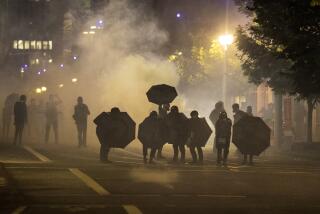Health effects of pepper spray
- Share via
Reports of pepper spraying at Occupy protests have been popping up all over the country, and images of those incidents have sparked many discussions about the possible excessive use of such methods. But what about the health effects on the people it’s been used on?
“The No. 1 effect is on the eyes. It’s so toxic it makes you close your eyes almost involuntarily,” said Dr. Mark Morocco, an associate clinical professor of emergency medicine at Ronald Reagan UCLA Medical Center. “People can get pretty sickened because it can be fairly potent.”
The spray is made with natural peppers, obtaining a 2 million- to 5 million-unit score on the Scoville Heat Chart (which makes Mexico’s famed habanero look measly at 200,000 units). Compared with tear gas, the spray is natural and therefore perceived to be harmless, but a high concentration of pepper could be toxic to those who have an allergy or asthma, Morocco said.
A paper published in 1999 by the North Carolina Medical Journal reported the sprays have become “popular as non-lethal deterrent agents. But there is no real scientific basis that [the sprays] are relatively safe.”
Incidents from Seattle, UC Davis and Portland, Ore., show the use of spray in the eyes, head and mouth on Occupy protesters, some of whom were treated at hospitals, but Morocco said it wasn’t a common occurrence.
“Almost nobody gets hospitalized. For most people it wears off between three to five hours,” he said, unless the person getting sprayed is of a certain age. “You don’t want to pepper spray your baby or your grandma.”
The spray -- other than irritating the eyes -- can get into the throat and lungs and cause plenty of coughing and gagging. There’s not much to be done after getting pepper sprayed because the mixture is very oily, but Morocco said the use of baby shampoo or baby wipes could be helpful due to their mild detergents.
Return to Booster Shots blog.
More to Read
Sign up for Essential California
The most important California stories and recommendations in your inbox every morning.
You may occasionally receive promotional content from the Los Angeles Times.










